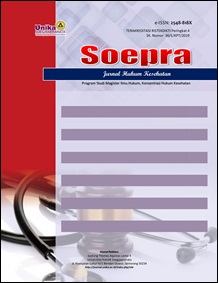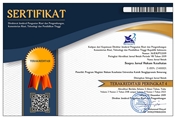The Rights to Informed Consent to Mental Disorder Patient in The Action of Premedication Electro Convulsif Therapy (ECT) at Regional Mental Hospital of Dr. Amino Gondohutomo of Central Java Province
Abstract
Medical action approval or informed consent is a communication process between patients and doctors; starting from giving information to the patients about anything dealing with the disease besides the medical actions that would be performed. If the patients understand they will then decide on their agreement. Therefore, patients with mental disorders need the assistance of their closest family members to understand the medical actions to be performed and to signify the informed consent following the Minister of Health’s Regulation Nr. 290 of 2008 on Approval of Medical Action.
Informed consent was also given to the patients of RSJD Dr. Amino Gondohutomo before conducting Premedication ECT following the Director’s Decree Nr. 445/231/2017 on ECT Service Policy at the Regional Mental Hospital Dr. Amino Gondohutomo, Central Java Province. The services included Premedication ECT (under anesthesia) and Non-Premedication ECT (without anesthesia). In accomplishing the rights to informed consent to the mental patients in premedication ECT action some obstacles had encouraged me to make a study on it.
This study used a socio-legal approach that would discuss the relevant regulations and see their implementation. The data were gathered by interviewing Deputy Directors, Medical Committees, Nursing Department, Legal Affairs, psychiatric doctors, nurses, and patients’ families besides having a library and related documents studies. The data were then qualitatively analyzed before being described and presented in a narrative form.
Based on the results of the study it could be concluded that the rights to informed consent to mental patients in premedication ECT action had not worked well because the patients’ families did not know any information regarding the side effects and complications even though they had signed. The informed consent did not guarantee that the patients’ families understood the information. In carrying out the job the doctors did not provide detailed information and did not re-evaluate the information that had been given before. The inhibiting factor the right to get informed consent was the fact that the doctors only gave informed consent once for several actions. The other inhibiting factors were difficulty to contact the patients’ families, distant access to the patients’ families, and homeless patients.
Keywords
Full Text:
PDFReferences
Adi, Rianto, 2005, Metode Penelitian Sosial dan Hukum, Jakarta: Granit
Ali, Zainuddin, 2010, Metode Penelitian Hukum, Jakarta: Sinar Grafika
Dantes, Nyoman, 2012, Metode Penelitian, Yogyakarta: CV Andi Offset
Guwandi, 1994, Informed Consent & Informal Refusal, Jakarta: Fakultas Kedokteran Universitas Indonesia
Kalat, James W, 2010, Biopsikologi, Jakarta: Salemba Humanika
Mertokusumo, Sudikno, 2007, Penemuan Hukum sebuah pengantar, Yogyakarta: Liberty
Notoatmodjo, Soekidjo, 2002, Metodologi Penelitian Kesehatan, Jakarta: Rineka Cipta
Soemitro, Ronny Hanitijo, 1990, Metodologi Penelitian Hukum dan Jumetri, Jakarta: Ghalia Indonesia
Wasito, Hermawan, 1992, Pengantar Metodologi Penelitian, Jakarta: Gramedia Pustaka
PERUNDANG-UNDANGAN
RI, Undang-Undang Nomor 29 Tahun 2004 Tentang Praktik Kedokteran
RI, Undang-Undang Nomor 44 Tahun 2009 Tentang Rumah Sakit
RI, Undang–Undang Nomor 18 tahun 2014 Tentang Kesehatan Jiwa
RI, Undang-Undang Nomor 38 Tahun 2014 Tentang Keperawatan
RI, Peraturan Menteri Kesehatan Nomor 290 Tahun 2008 Tentang Persetujuan Tindakan Kedokteran
RI, Peraturan Menteri Kesehatan Republik Indonesia Nomor 4 Tahun 2018 Tentang Kewajiban Rumah Sakit Dan Kewajiban Pasien
RI, Keputusan Menteri Kesehatan Nomor.02.02 Tahun 2015 Tentang Pedoman Nasional Pelayanan Kedokteran Jiwa
Peraturan Daerah Provinsi Jawa Tengah Nomor 1 Tahun 2009 Tentang Retribusi Pelayanan Kesehatan Provinsi Jawa Tengah
JURNAL ILMIAH
”Elektro Konvulsi“, Jurnal Psikiatri, volume 3, Nomor 1, ISSN 2355-2409, 2014. http://journal.unair.ac.id/PJS@terapi-elektro-konvulsi-(tek)-article-7431-media-69-category-3.html. Diakses tanggal 23 maret 2018 jam 18.00 WIB
DOI: https://doi.org/10.24167/shk.v6i1.1990
Refbacks
- There are currently no refbacks.
Copyright (c) 2020 SOEPRA







